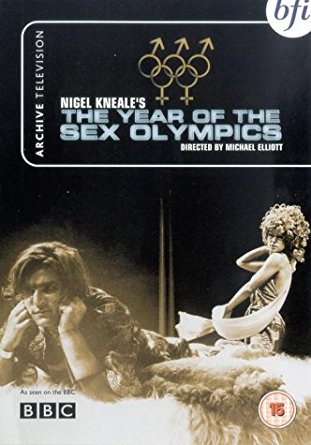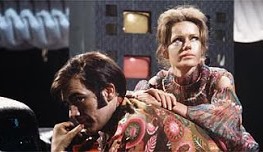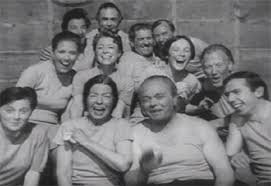IMDB meta data: run time 1 and 45 minutes; scored at 7.3/10 by a paltry 124 voters.
‘Coming sooner than you think,’ is the opening title card. About time, cried the fraternity brothers!
Made fifty years ago, this film is an anticipation of reality television, even before ‘Death Watch’ (1980).

The set up? The televised trials for a place at the next world Sex Olympiad are underway in a television studio. Watched from a control room by the bored producers, clad in paisley pajamas, who are dedicated to keeping the viewers apathetic in a society where
‘it is better to watch than to do.’
They watch and so do we. The vicarious sex on the telly is to sate the libidos of the audience so that there is less reproduction. (Pornography has never done that for the fraternity brothers.) There are other sex program catering to the artistic. Another program is aimed at reducing the appetite for food through custard pie throwing. Very Three Stooges. There is a joke about this in the credits with a long list of consultants on pie throwing, including Bernard from ‘Yes, Minister.’
 Those jammies.
Those jammies.
In general the purpose of television is to quell the emotions, drives, and impulses of people because they cause conflict. The goal is a quiescent society. like Canberra on Saturday night.
This situation has gone on so long that the current generation we see no longer seems to know the larger context or purpose or the historical evolution of the industry and the society it serves. It just is this way.
Everyone speaks a clipped functional language. The television producers are High-Drive people. The audience they cater to consists of Low-Drive people, the vast majority. That translates readily to the world of Channel 7Mate where the producers cater to an audience they despise and make millions doing it. No one goes broke underestimating the tastes of that demographic where urine drinking is a competitive sport.
Finding the balance in this television game is tricky. Nat with eyebrows that often speak for themselves is pressured from above by the Controller, a standard BBC term, to improve his programs and threatened from below by a underling who wants his job. Situation normal in an organisation but mercifully this depiction is pre-KPI so there is no cloudy and vague McKinsey-speak further to confuse matters in the name of clarity.
Two disruptions occur. First an artist arrives in the studio and he wants to upset people with horrifying pictures. Think of Evard Munck’s ‘The Scream’ or the Twit in Chief smiling. Ugh! These people are indeed horrified by the art. The studio High-Drives are so cocooned they have never seen an unpleasant sight. The artist tries to disrupt a broadcast to show one of his pictures and becomes one himself when he falls to his death!
Eyebrows, however, finds the pictures fascinating, albeit unsuitable for broadcast. He is, perhaps, not quite as superficial as he seems, then into his life comes a personal crisis when a child by his first wife is tested as Low-Drive, which will reflect badly on him. He has no interest in Ex or Child except as they show in his file. He is a very model of a modern McKinsey manager avant le mot and only thinks of his KPIs.
The idea emerges of isolating a couple on a deserted island amid cameras so that viewers can watch them cope. Eyebrows and Ex volunteer with Child. These three missed Scouting and know nothing. They do not know what fire is let alone how to start and maintain one or to pull a vegetable out of the ground on the windswept rain-soaked island in Holland Park to which they are consigned.
They have copious instructions from Wikipedia on an iPhone which are frequently consulted. Eyebrows had an iWatch in the studio bit he did not take it to The Island where he went low tech.
The program is called ‘Living Life.’ The audience finds it amusing and it is a hit. The audience by the way is represented by a focus group of twelve garbed in pink sweatshirts and pants. These are the Low-Drives of Channel 7Mate.
Without the professor from Gilligan’s Island, Eyebrows and Ex are hopeless. They have been spoon fed so long that they only know the shape of the spoon. Child falls, breaks an arm, and slowly dies of an untreated infection.

The sweatpantsers find that hilarious. Ratings soar. (See, like ‘Death Watch.’)
The inevitable comparisons are the E.M. Forester story ‘When the Machine Stops’ and George Orwell’s ‘Nineteen Eighty-Four.’ Though as to the latter, there is no hint here that there is a regime oppressing people per Orwell but rather a commercial enterprise giving the Pink Sweatpants Nation what it wants, when it wants it, and how it wants it. Is not that broadcast populism, or democracy? Responding to what the people want is one definition of democracy.
This is another gem from the fecund typewriter of Nigel Kneale. The players include Reginald Perrin and the estimable, but here very young, Brian Cox. I found it on the Internet Archive.
It was filmed in colour but only a black and white archival print remains. The expensive colour film was reused though why the BBC did it in costly colour at a time when there very few colour televisions to see it on is anyone’s guess.
Inspired by this viewing, I will look for ‘Death Watch.’
Skip to content
